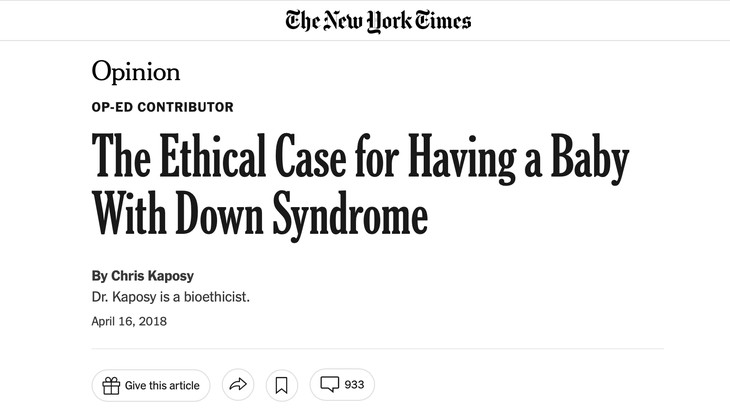Autism is not “curable.” Neither are intellectual disabilities
And as incurable conditions, they are now considered a legitimate reason for state-assisted suicide.
The result? 1 out of 5 assisted suicides list autism or intellectual disabilities as the sole reason for seeking assisted suicides, and over 40% list one or the other as a factor.
Netherlands euthanizing autistic and intellectually handicapped people, researcher finds https://t.co/lshVIPdznx
— Fox News (@FoxNews) June 28, 2023
This is full Nazi. Never go full Nazi.
When most of us think of the Holocaust we think of the extermination of the Jews, and rightly so. Jews were the primary target and the majority of people who were killed.
But the extermination of the Jews was only one of the goals; the overarching goal was to eliminate the reproduction and/or existence of human beings considered to be genetically deficient, and that included the handicapped–especially the mentally handicapped.
As we have already discussed, in Canada being handicapped or mentally ill are considered a legitimate reason for seeking Medical Assistance in Death (MAID), and the Netherlands has policies that allow and even implicitly encourage people with “incurable” mental anomalies to off themselves.
Netherlands programs have euthanized otherwise healthy individuals with autism and intellectual handicaps in recent years, researchers have found.
Five individuals under the age of 30, who cited autism as a factor in their decision to seek legal euthanasia, are among the cases reviewed by specialists at the U.K.’s Kingston University.
“Factors directly associated with intellectual disability and/or ASD were the sole cause of suffering described in 21% of cases and a major contributing factor in a further 42% of cases,” Kingston University’s report on the issue found.
The study noted that in many cases, doctors determined there was “no prospect of improvement” for intellectually challenged individuals because there is no treatment for their handicap.
“Reasons for the EAS [euthanasia and physician-assisted suicide] request included social isolation and loneliness (77%), lack of resilience or coping strategies (56%), lack of flexibility (rigid thinking or difficulty adapting to change) (44%) and oversensitivity to stimuli (26%). In one-third of cases, physicians noted there was ‘no prospect of improvement’ as ASD and intellectual disability are not treatable,” the study reads.
This is the new definition of compassion in extensive welfare states where the disabled are an expensive burden on the state.
This is simply an extension of the push to abort babies who have been diagnosed with Down Syndrome, an incurable condition caused by a chromosomal anomaly. Iceland has almost eliminated the incidence of Down Syndrome in live births through the simple expedient of killing all babies who may have the condition.
How nice.
The stigma against bearing children who are not considered genetically perfect is so strong that the New York Times actually published a piece arguing that there is actually an ethical case for allowing children afflicted to be born, as if being disabled makes one too large a burden on society to exist.

It shouldn’t take a bioethicist to explain why disabled people should be allowed to live; it should only require having a soul.
This attitude, though, is implicit in modernist materialism that defines the value of life for oneself as being entirely defined by one’s ability to be entirely hedonistic, and whose value to others is determined by one’s cost to society. Life, in and of itself, has no value.
In fascist and communist regimes, both statist rather than rights-based, the only metric that counts is one’s value to the state. Modern Western societies add a couple more variables: the ability to indulge in sexual pleasure in particular.
You do get to be judged on a sliding scale, though, based on some intersectional sliding scale, a kind of affirmative action of human value.
No matter what the criteria used, the bottom line is the same: because life is not a gift from God, your fellow human beings get a vote regarding whether you may live.
The case for assisted suicide at the end of life has always made sense to me, although I am nowhere near convinced that any society can adopt the practice without sliding down this slippery slope. People in excruciating pain without hope for respite are sympathetic victims of a hopeless situation, and one would have to have a very hard heart to deny their pleas for relief as worthy of consideration.
But societies that openly adopt and regularize such practices always seem to wind up going full Nazi, picking and choosing who is living a life worth societal support. We know the Canadian government has regularly encouraged disabled and mentally ill people to kill themselves, and it’s hard to imagine that people who are convinced they are burdens on others don’t sometimes feel pressured to relieve the burden on others.
This is a form of eugenics and “purification” of society, and dystopian.
Time and again we see that worries about slippery slopes are not simply the result of logical fallacies, but realistic concerns that almost always come to pass.
When we dull our moral senses, our moral senses become ever blunter until we arrive at a place that all of us would be appalled to be at the beginning of the process.
And we wind up doing things like killing people for being intellectual disabled or even autistic.







Join the conversation as a VIP Member